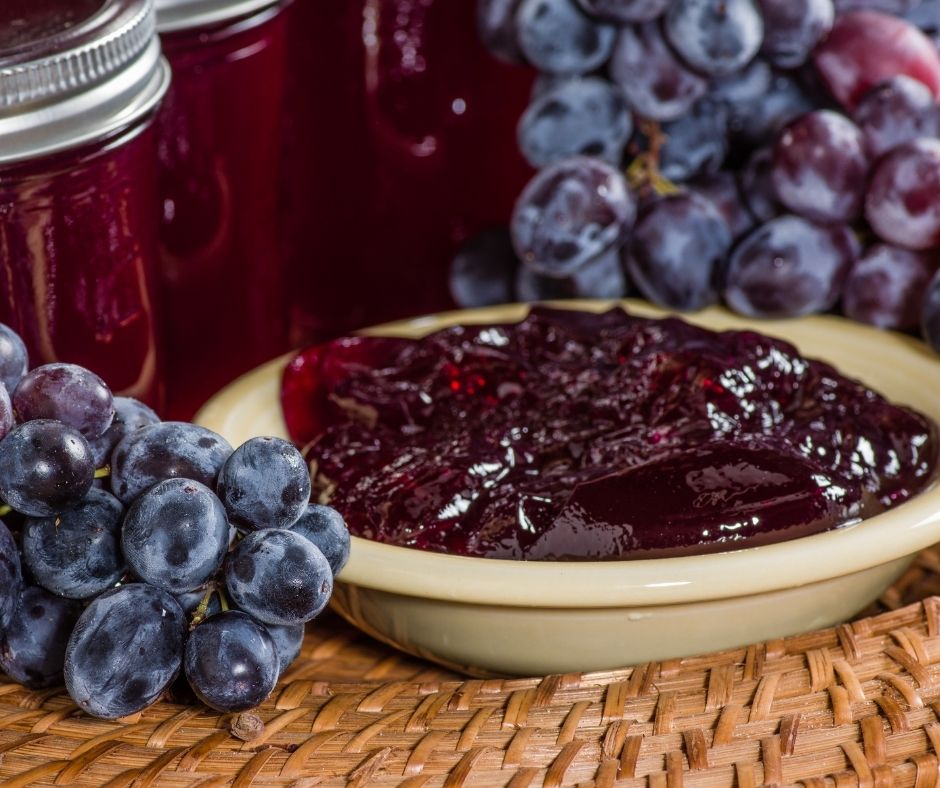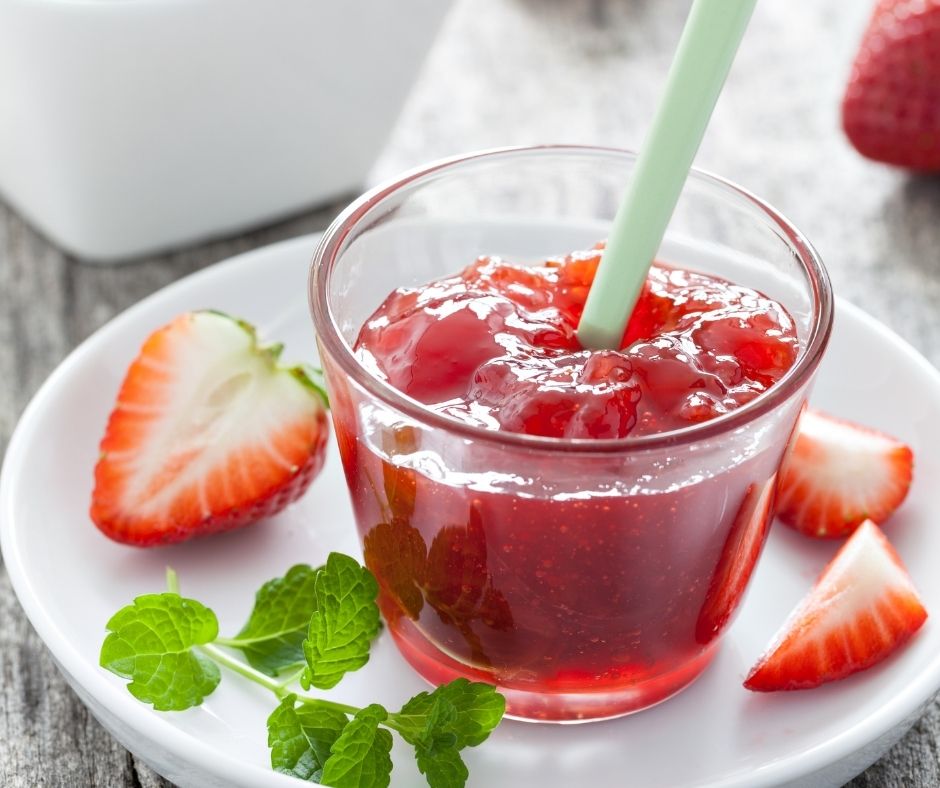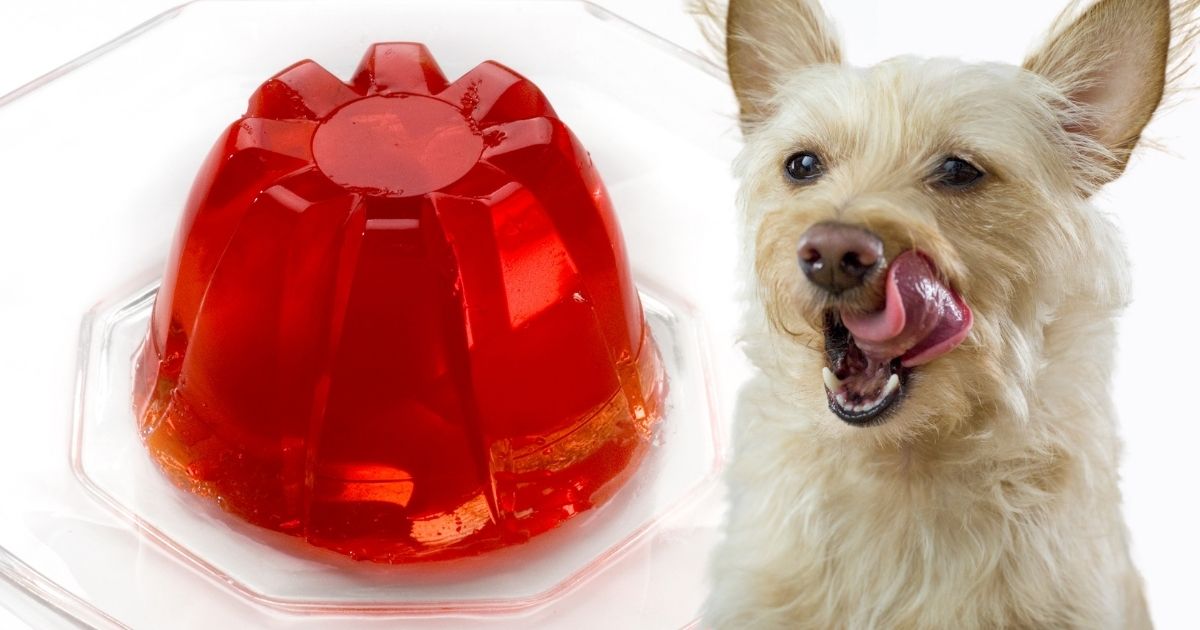Jelly is a favorite dessert for many people, and you may fall under this category. The sweetened taste and undeniable nutrients make it a popular snack.
However, you may want to be generous and share what you love with your animal best friend, you should be careful about what you feed a dog.
But can dogs eat jelly? What happens if a dog eats jelly?
Many dog breeds will eat anything that’s offered and can be adventurous enough to grab some extra off a kitchen counter.
They have little sense of right and wrong, especially when it comes to food.
As the owner, you should determine what is healthy, what should be kept moderate, and what is toxic.
Where does jelly fall in?
No yes/no answer would be sufficient for this as there are many forms of jelly, each with its set of challenges.
However, we will start by stating you should be cautious about feeding jelly to a dog as it isn’t the best choice for a proper diet.
While it has gelatine which is good for canines, some other ingredients may be red lights.
Let’s take a look at the general reason why you should be concerned if your dog wants to eat jelly.
Thereafter, we’ll examine the different forms of jelly people eat. With each one, we’ll look at the reasons why it may be okay or dangerous for dogs to consume.
Can Dogs Eat Jelly?
While jellies are made of fruits and have a nice scent that attracts dogs to them, jellies contain a high amount of sugar.
The sugar level is a bit on the edge for humans, and over the top for our doggy friends.
Dogs don’t need the amount of sugar jelly carries as it can lead to many problems.
These problems with jelly for dogs include:
- Diabetes
- Toothache and tooth decay
- Obesity
- Pancreatitis
Sugar has a harsher effect on dogs than it does on humans, especially since the latter has stronger resistance and can consume more sugar.
While it is true that jelly has some good nutrients, the sugar level makes others irrelevant to a dog.
It doesn’t end there. Jelly also contains an artificial sweetener known as Xylitol.
This sweetener has a toxic relationship with dogs and should be kept far away from your pet.
Even a small, ‘harmless’ amount can build up to break down your dog’s system.
Dogs consuming Xylitol are at risk of liver failure, seizures, low blood sugar levels, and even death.
To further buttress our point, in the following paragraphs we will pick apart the ingredients in jelly.
Are the Ingredients in Jelly Bad for Dogs?
Jelly was prepared with many ingredients, most of which aren’t what you want your dog eating if you want him to live long.
Good health is something you shouldn’t compromise, even for a scoop of jelly.
Here are some popular ingredients used in jelly:
- Sugar: Sugar takes up more than 50% of a whole jelly, leaving less than a half for others to fit in.
This is the main ingredient that made us rule out jelly as a part of a dog’s diet. Dogs enjoy sugar as much as we do, but it is unsafe for them.
- Fruit: Some fruits are beneficial to dogs, others are poisonous. If you do want a manageable jelly to give your dog’s tongue a little sweetness, avoid those with toxic fruits. More on this when we get to the different forms of jelly.
- Pectin: Pectin is a type of fiber seen in fruits. It has its pros and cons, and it is not recommended for dogs.
Pectin even affects humans. It is known to cause cramps, stooling, and diarrhea.
- Xylitol: As we’ve seen, xylitol is a definite no on ingredients that are good for dogs.
Is Jelly Bad For Dogs?
Dogs may get away with a small amount of jelly, but considering the dangers and other better alternatives, it isn’t worth it.
It is delicious, and you may find it hard to refuse a dog’s plea, but tough love is needed here. After all, it is for his good.
Here are some better alternatives to jelly you can give your dog:
- Bananas
- Peanut Butter
- Sweet potatoes
- Banana pudding
- Yoghurt served with berry
- Watermelon
- Apple
- Strawberry
- Cake (sugar-free)
What Should you Do If your Dog Eats Jelly?
This information should make you keep an eye out if you have jelly in the kitchen and your indoor dog is awake and around.
Take some preventive steps by putting the jelly away from the reach of your pooch. You can also keep your dog busy so he won’t get bored and wander.
That said, you can never be too careful. Dogs are cunning, and yours may slip by while you flip through channels on an idle afternoon.
His intelligent mind and instincts would let him know there must be goodies in the kitchen, and he’d go rummaging.
If your dog swallows jelly, the first step is to remain calm.
Most dog breeds can pick up on the vibes of their owners, and if your pet notices fear in you, he could get antsy. Try not to panic or throw a fit.
Next, check the ingredients list of that particular jelly product. Brands differ, and not all will use the toxic ingredients we mentioned earlier.
You may be lucky to find that your jelly is free of pectin or xylitol. In that case, simply observe for any reaction, especially if it is the conventional jelly with lots of sugar.
If you do see xylitol, pectin, or some toxic fruits listed, get your dog to a veterinarian to be diagnosed.
Can Dogs Eat Grape Jelly?

Admittedly, grape jelly is a treat many people enjoy (except you’re allergic to grapes or don’t fancy it).
Don’t be surprised when your dog eyes you as you bring out a jar of grape jelly from the refrigerator.
However, if other forms of jelly can be managed, grape jelly shouldn’t. It is toxic for dogs on two counts:
- There’s the high sugar level.
- There’s the grapes, which are toxic to dogs.
It is not clear what exactly in grapes and raisins make dogs react negatively. It only takes one grape to put your dog in jeopardy.
Intake of grape can lead to kidney failure, stomach pain, vomiting, weakness, and a sudden loss of appetite.
Can Dogs Eat Strawberry Jelly?

As a fruit, strawberry is healthy for dogs. It supplies a rich assortment of vitamins, including Vitamin B1, Vitamin B6, Vitamin C, and Vitamin D.
It also provides fiber, Omega-3 fatty acids, and even magnesium.
Nevertheless, once jelly walks into the party, the mixture becomes a pooper.
Strawberry Jelly is not considered suitable for dogs because of the sugar in the jelly. Better to give your dog fresh strawberries.
Can Dogs Eat Raspberry Jelly?
Raspberry has some benefits to dogs, similar to strawberries. A natural raspberry has a low sugar content and is rich in vitamins, manganese, and fiber.
Like the case of strawberry jelly, the problem is the jelly. More specifically, the sugar in the jelly.
Can Dogs Have Jelly Beans?
Jelly beans should be in the forbidden zone, staying under ‘food dogs should not eat.’ Like normal jelly, jelly beans contain a high amount of sugar.
There are also artificial sweeteners that are unhealthy for dogs (or for you, if you take too much of it.)
In case you’re wondering about the sugar-free jelly beans, most of them contain artificial sweeteners, including the notorious xylitol.
Wait. Jelly beans also come in other forms. Can dogs eat black jelly beans?
Again, just like jelly beans, you should avoid feeding your dogs black jelly beans. The primary ingredient in black jelly beans is sugar which can be harmful to canines.
Can Dogs Eat Jello?
The attractive and enticing jello doesn’t pose any significant danger, except that it has a high sugar level. Some brands also add xylitol and other sweeteners.
You can opt to make it at home, in which case you’d be in control of what goes in. However, jello should be used only as a treat.
Can Dogs Eat Jelly Tots?
Jelly tots also contain a high amount of sugar, making them unsuitable for dogs. Jelly tots are full of simple sugar which can alter the rate of insulin in a dog’s body.
What’s more, jelly tots often have artificial sweeteners. They are what make these treats sweet. As we already know, artificial sweeteners are harmful to dogs.
Can Dogs Eat Peanut Butter and Jelly Sandwiches (or other jelly combination)?
The thought of a peanut butter and jelly sandwich is enough to get you hungry and eager to eat. For a dog, it is a bit complex.
Normally, peanut butter and jelly sandwich are safe for a dog. Peanut butter has some low-sugar varieties you can pick up at the store.
Bread isn’t toxic either, but may not be nutritious to a dog because of the dominant carbohydrate. We already know the problems with jelly.
Also, some brands add xylitol to peanut butter. If you want to feed your dog a peanut butter with a jelly sandwich, ensure that xylitol is absent. If in doubt, do not proceed.
Overall, a dog can eat a peanut butter and jelly sandwich, but it must be a small quantity. The same goes for a couple of other jelly combinations you may want to try.
Recommended:
Can Dogs Eat Fruit Snacks? (Welch’s, Gummy, Motts)
Is jelly poisonous to dogs?
Jelly is not considered toxic or poisonous, but some ingredients can make it so. Xylitol and some other artificial sweeteners used in jellies are harmful to dogs.
The sugar content is high too, and some fruits used to make jelly are bad for dogs. An example is grapes.
Can dogs eat jelly or jam?
Jelly and jam pose the same health risk to dogs. They have a lot of simple sugar which can give the dog diabetes or affect the dog’s teeth. Your dog shouldn’t be given jelly or jam as a constant diet.
What other gelatin can dogs eat?
While the jelly isn’t good for dogs, there is another gelatin a dog can eat. It should be without flavor or excess sugar. This form of gelatin is good for your dog
Wrap Up
The answer is clear. Any edible with high sugar should be kept far away from your dog. Jelly and its cousins are no exceptions.
The sugar level isn’t healthy for a dog. Also, the xylitol and fruits like grapes could weaken—and even kill—your dog.
It is best to deny your dog of jelly than try to see how much he can cope.
Try out some other treats that will make your dog happy without putting his health on the line. You’d be glad you did.
You May Also Like: Can Dogs Eat Corned Beef? Is It Toxic to Dogs?







